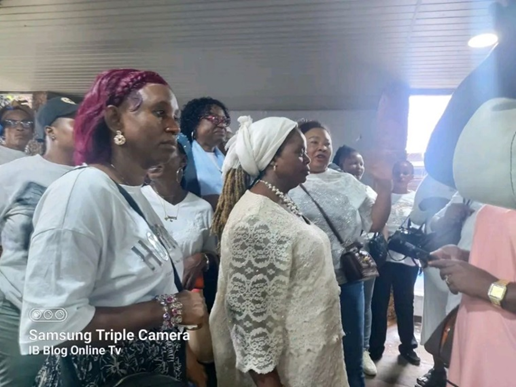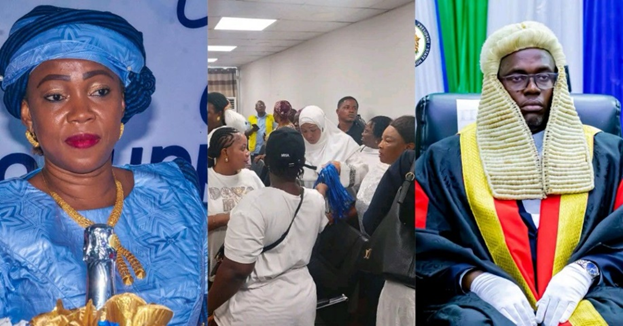By Mackie M. Jalloh
Parliament is often described as the heart of Sierra Leone’s democracy, a place where laws are shaped, and the dignity of national leadership is upheld. Yet on the day of the State Opening of the Third Session of the Sixth Parliament, that dignity was breached in full public view. What should have been a solemn national occasion turned into an episode of public disrespect when some Members of Parliament broke into the crude chant, “You coco roast oh,” as First Lady Fatima Maada Bio made her way into the chamber.
The incident was captured on video, spreading quickly across social media, and igniting heated discussions both on and offline. Many Sierra Leoneans, regardless of political leaning, expressed shock and disappointment—not merely at the words used, but at the setting in which they were uttered. This was not a market banter, nor a private quarrel; it happened inside the country’s highest lawmaking body, before a national audience, and in the presence of foreign dignitaries.
In the days that followed, the Women’s Leader of the Sierra Leone People’s Party (SLPP), supported by a powerful delegation of female executives from across the country, decided that silence was not an option. On Tuesday, 12 August 2025, they arrived at Tower Hill in large numbers with a clear purpose: to confront the Speaker of Parliament directly and demand a public apology to the First Lady.
The SLPP Women’s Wing made it plain from the outset that their mission was not a political stunt, nor a street protest. Rather, it was a deliberate, principled intervention rooted in defending the dignity of women in public life and reinforcing the standards expected of Parliament. “This is about respect for national figures and about Parliament upholding its own integrity,” one senior member stated during the visit.
Their decision to engage the Speaker face-to-face sent a strong signal that women in Sierra Leone will not accept the public humiliation of one of their own—especially not in a context that carries ceremonial and national significance. The First Lady, they reminded the Speaker, is not just the wife of the President; she is an active public servant in her own right, spearheading campaigns on education, child protection, and women’s empowerment.
Inside the Parliament building, the delegation held formal discussions with the Speaker, Hon. Sengepoh Thomas. The women laid out their grievances with clarity: the chant was demeaning, the behavior unbecoming, and the damage to the image of Parliament undeniable. They emphasized that such conduct does not just target one woman but undermines the very notion of respect in public institutions.

In response, the Speaker acknowledged their concerns and assured them that the matter was already under review. He pledged that those responsible would be identified and held to account through appropriate disciplinary channels. While this was a step in the right direction, the women made clear that their expectations go further: a formal, public apology to the First Lady from the Speaker himself, and visible consequences for the individuals involved.
The SLPP Women’s Wing was quick to stress that this was not about party rivalry or political posturing. It was about principle—ensuring that Parliament, as the country’s legislative authority, sets an example of civility and decorum. If lawmakers can engage in personal insults during a State Opening, they argued, what message does that send to the public about how political disagreement should be handled?
By taking this stand, the SLPP women also positioned themselves as defenders of women’s dignity in a political space still dominated by men. In a country where women are fighting to maintain and expand their presence in leadership roles, public disrespect of this nature risks normalizing the idea that women—no matter their position—are fair targets for ridicule.
In their approach, the SLPP women offered a template for how grievances of this nature should be handled—peacefully, respectfully, but with unwavering firmness. They did not block roads, hurl insults, or descend into the same conduct they were condemning. Instead, they exercised their right to seek redress through direct engagement with those in authority, presenting their demands clearly and following proper channels.
They also made it clear that their visit was not a one-off gesture. They intend to monitor the matter closely until a resolution is reached, demonstrating that follow-through is as important as the initial act of protest. This commitment to sustained advocacy is a sign that the incident will not simply fade into the background without accountability.
The SLPP Women’s Wing has now placed the ball firmly in Parliament’s court. A public apology from the Speaker would not only repair some of the damage done but would reaffirm Parliament’s commitment to respectful conduct. Equally important is ensuring that those involved face consequences, sending a message that such behavior will not be tolerated in the nation’s highest legislative chamber.
The episode also offers a broader lesson for all political actors: leadership is not only about power and votes—it is about example. The First Lady’s work in championing education, child welfare, and women’s rights has been recognized internationally. She deserves, at the very least, the respect due to any public servant, especially within the walls of Parliament.
The actions of the SLPP Women’s Wing show that dignity in public life is worth defending, and that when institutions falter, citizens—especially women—have both the right and the responsibility to demand better. If Parliament responds appropriately, this incident could mark not just a moment of shame, but a turning point toward higher standards.
For now, Sierra Leone waits to see whether its lawmakers will match the example set by the women who came to Tower Hill—not to disrupt, but to defend.



